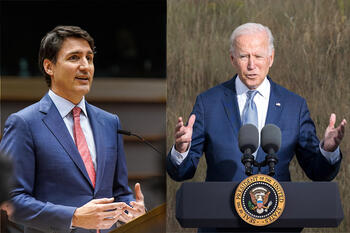
Canadians, outside of dual citizens, can’t vote in America’s midterms, but the results may well shape the country’s trajectory in the years to come.
The current crisis around inflation, a probable recession, rising heating costs and electricity prices, with increases in Canada of upwards of 50 percent or more, as well soaring food prices are clearly shaped by global forces. But the economic crisis also has roots in the well-financed green movement’s war on fossil fuels. These turn out to be critical to such industries as manufacturing and logistics while the drive to ban natural gas based fertilizers constitutes a gun at the head at the farms that feed the world.
By rights, this should be a time of enormous opportunity in North America. Canada is third in oil reserves in the world and fifth in production, while the U.S. now ranks first. In food production, the U.S. and Canada rank in top five of exporters. Yet despite this, both President Joe Biden and Prime Minister Justin Trudeau seem determined to fritter away this edge by embracing maximalist “net zero” energy policies. Deputy Prime Minister Chrystia Freeland reflexively sees Ukraine invasion as just another reason to accelerate renewables and wipe out fossil fuels.
True progressives interested in the working and middle classes should oppose this approach. Canada’s large energy sector, notes a TD Waterhouse study, helped shield Canada from the kind of “labour market polarization” that hit many regions in the United States. A radical shift to “green energy,” notes one research report, will likely accelerate class divergence in both countries. Already the Biden energy policies, which includes extensive bans on drilling on federal and offshore lands, has resulted in an economy that is $100 billion smaller annually than it otherwise would have been.
Despite the jihads on fossil fuels in North America and the European Union, oil is still going to be a big business in 2040, growing virtually everywhere outside of the declining EU. In the U.S. in 2021, oil use grew four times the rate of solar and wind together, while global numbers show much the same pattern. Last year, notes analyst Robert Bryce, the increase in global hydrocarbon use equalled the output of all of the wind and solar projects on Earth.
The critical geopolitical question lies in where future energy will come from — largely unregulated, authoritarian countries like Iran, Russia, Saudi Arabia or Venezuela or still thriving democracies like Canada and the U.S.? The environment would be a clear loser when countries like Canada, with strong controls, is displaced by poorer, and less scrupulous, countries. Sadly, as environmentalist Michael Schellenberger points out, Biden seems to prefer getting oil from abroad than from North American sources.
Read the rest of this piece at National Post.
Joel Kotkin is the author of The Coming of Neo-Feudalism: A Warning to the Global Middle Class. He is the Roger Hobbs Presidential Fellow in Urban Futures at Chapman University and Executive Director for Urban Reform Institute. Learn more at joelkotkin.com and follow him on Twitter @joelkotkin.
Photo: via Flickr, Justin Trudeau, and Joe Biden under CC 2.0 License.












